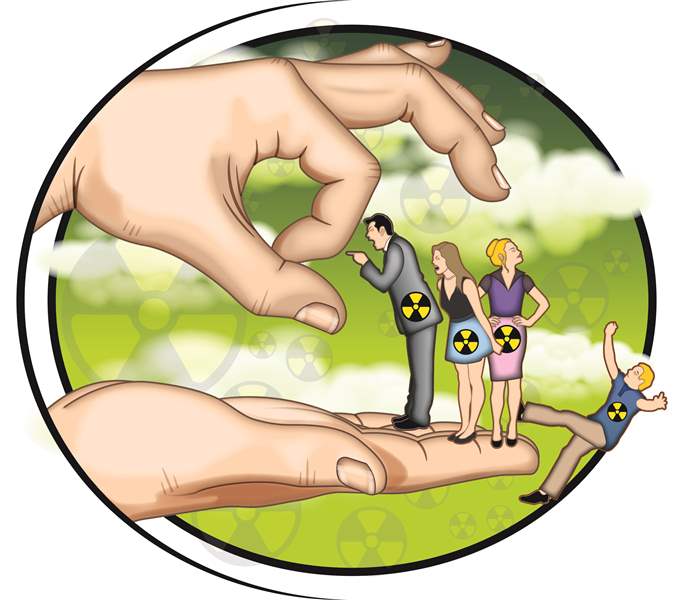
Detoxify: Experts advise when, how to end bad relationships
3/4/2018
BLADE ILLUSTRATION
The put-downs, the mind games, the manipulations.
The countless times he would pressure her to ditch her family or friends so that she could hang out with him, and then, when she showed up, make a point to ignore her.
In retrospect, it’s easy for Christy to identify her relationship with her high school sweetheart as toxic. But, at the time, she recalled recently, it wasn’t so clear.

“When you’re young, you have this idea that if someone is posting pictures of you on social media and bringing you flowers, it must be a great relationship,” she said. She continued, recalling her thinking at the time: “A toxic relationship might be physically abusive, and there isn’t really an in-between.”
There is, of course, an “in-between,” as Christy today knows well.
That in-between is full of criticism, control, defensiveness, and drama. It can crop up in any type of relationship, not just romantic, and can noticeably influence a person’s health and well-being.

Pottkotter
Toxic relationships have been attracting an increasing amount of attention in recent years, according to mental health experts who counsel those coping with the verbal and emotional abuse such relationships typically entail. Tiffany Pottkotter, a psychiatric nurse practitioner at ProMedica Physicians Behavioral Health in Findlay, said that while conversations about these types of non-physical abuse would have been somewhat unusual even less than 20 years ago when she was starting out in the field, she now routinely counsels patients on dealing with toxic individuals.
In some cases the best way to do this is by completely cutting ties, she and others said.
“It’s so important who we surround ourselves with,” Dr. Victoria Kelly said. “They can bring us up or bring us down.”
Dr. Kelly is the director of the psychiatry residency program at the University of Toledo Medical Center, the former Medical College of Ohio hospital. While there’s no definitive checklist to identify the traits of a toxic relationship, she and others pointed to criticism, contempt, and control as characteristics that frequently crop up.
A toxic person might leave a friend, family member, significant other, or co-worker feeling like they’re walking on eggshells, worrying about the reaction that a word or action might spark.
Whereas a good friend makes a person feel positive and supported, Ms. Pottkotter said, a toxic one is “going to do everything to pull you down with them.”
A toxic relationship doesn’t necessarily start with red flags. Christy said it wasn’t until about a year into her years-ago relationship that the “honeymoon” period ebbed away and she began to notice the toxic elements, which she recalled left her feeling badly and wondering what she must be doing wrong to make her then-boyfriend treat her the way he did.
Dr. Kelly said any relationship between two people is always in flux, so what starts as a healthy or supportive relationship can later become toxic; a toxic relationship could also shift back into a healthy balance. She said that a significant change in the life of one person or the other — maybe a marriage or a new job — can in some case be the stressor that pushes a relationship toward toxicity.
While toxic relationships are by no means a new phenomenon, Dr. Kelly, like Ms. Pottkotter, said she’s noticed an increasing amount of attention paid to them in recent years. So has Erin Wiley, a therapist and owner of the Willow Center in Maumee, who said she regularly works with patients who describe these characteristics.
While Ms. Wiley said she hears the phrase used more liberally than it should be in some cases — not every relationship that ends on poor terms is because one or the other partner is toxic, she said — she also sees the conversations reflecting a wider shift in society.
“Back in the day, no one ever talked about it. You kept your mouth shut,” Ms. Wiley said of the emotionally manipulative behaviors she hears about so frequently today. “Now there’s a culture that we don’t tolerate it.”
And that’s a good thing: As she and others pointed out, these types of relationships can have serious consequences.
Ms. Pottkotter said that interacting with a toxic person can change the way individuals think about themselves and can hold them back from reaching their full potential. Michelle Stoyell-Conti, a psychologist and a behavioral health consultant at Mercy Health, said long-term effects could also include feelings of depression or anxiety.

Stoyell-Conti
In severe cases, Ms. Stoyell-Conti said, it can even cause a person to develop post-traumatic stress disorder.
But taking action, while important, is often easier said than done.
Experts said that the nature of the relationship will inform whether it’s best to cut ties or, less dramatically, to establish and enforce firm boundaries. Factors to consider include with whom the toxic relationship has developed and how severe the toxic behaviors have become.
“You can easily cut them out if they don’t mean that much to you to begin with, if they’re just an acquaintance or a co-worker,” Ms. Kelly said. “However it’s much more difficult to do that if they’re a family member and you have the belief that you need to stick with family.
“So the boundaries that you draw with the toxic person may differ depending on the nature of the relationship that you have.”
Consistency and assertiveness are key in communicating to a toxic person that a relationship is about to change, according to experts. They also stressed the importance of doing so in an environment and manner in which the person who starts the conversation feels safe.
If he or she decides to maintain the relationship, it’s important to clearly communicate to the toxic person which behaviors will no longer be tolerated and call attention to them every time they occur, Dr. Kelly said.
Ms. Pottkotter said setting boundaries might also encompass establishing how and how frequently two people communicate. Again, she said, once the ground rules are set, it’s important to stick to them firmly.
If a person decides to cut ties, Dr. Kelly recommends clearly informing the toxic person, setting a deadline for cutting off communication, and holding to it.
“Don’t feel like you owe them a huge explanation,” she added, “because that’s never going to be enough. Once you have decided this relationship needs to end, stick with it.”
It will likely be tough.
“You’re going to feel a lot of feelings, and you need to be able to manage that,” Dr. Kelly said. “You’re going to go through the phases of grief. You’re going to feel guilty. You’re going to feel angry and depressed. But eventually you’ll come to accept it.”
And, ultimately, that should feel better.
It certainly did for Christy, who recalled a few disastrous attempts at friendships with her ex-boyfriend after an ugly breakup in college. They no longer talk, and, looking back on the situation, she said that’s clearly for the best.
“It was probably the healthiest thing to just clean my slate, as far as he went,” she said, adding later: “I feel a hundred million times better than I did those days.”
Contact Nicki Gorny at ngorny@theblade.com or 419-724-6133.